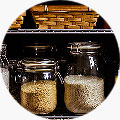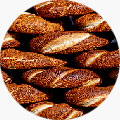Turkish traditional phylo - filo pastry sheets. These are freshly made by our Teyze's, very thin, big and round sheets of dough used for various kinds of pastries (börek), baked of fried.
If you had been in Turkey, or at least if you had been introduced to Turkish Cuisine, then you probably know what is yufka. And if you do, then you also probably realized that most of Turkey’s so-called beş çayı (tea time) menus are usually made with yufka. While in most of the puff pastry recipes I’ve been posting usually involve yufka, most of the tea time recipes that I will be posting in the future will mostly include yufka, too.
So what is yufka?
To those who are unfamiliar with it, yufka is a round and very thin sheets of unleavened flour dough. It is used to make Turkish flatbread and pastries, and has been considered as one of the most important food items in the Turkish as well as in the Balkan and Middle Eastern cuisines. Some say that yufka may have been the earlier form of phyllo/filo dough. More specifically, Turkish yufka is usually made from wheat flour mixed with a little salt and water to form a dough.
What are the types of yufka?
There are several types of yufka that are prepared in Turkey. One type of yufka that is prepared for immediate consumption is called günlük yufka – the ones that most Turkish women prefer to use because it is usually fresh and soft which will make any pastry (or for making rolls and wraps) more delicious. Günlük yufka are usually sold in açık pazarı (open market) as well as in bakkal or some small grocery stores. They are labeled günlük yufka which means they are daily fresh made Phyllo dough.
Another type of yufka are the frozen ones. These yufka are usually used for making quick and easy pastry such as sigara börek, tepsili börek, baklava, etc. Their large round shapes are usually perfected by commercial dough rollers or machines that are specifically used to make phyllo dough. They are widely available in supermarkets and grocery stores and are nicely packed in air-tight packaging and have a slightly longer shelf life than günlük yufka.
On the other hand, yufka can also have a very long shelf life. These type of yufka are prepared for later consumption. The sheets of thin dough are usually dried on a sac so that it can be stored for up to six months or more. These type of yufka are usually dry so they require a sprinkle of warm water to moisten its large round sheets and then covered with cotton cloth (while resting for a few minutes in room temperature) just before consumption.
Important Information
The above details have been prepared to help you select suitable products. Products and their ingredients are liable to change.
You should always read the label before consuming or using the product and never rely solely on the information presented here.
This information is supplied for your personal use only. It may not be reproduced in any way without the prior consent of TurkishPorter Ltd and due acknowledgement.












